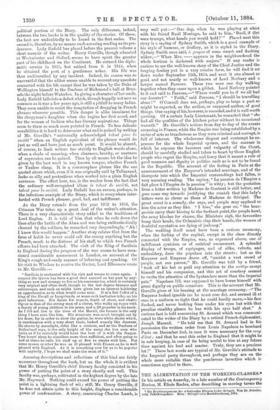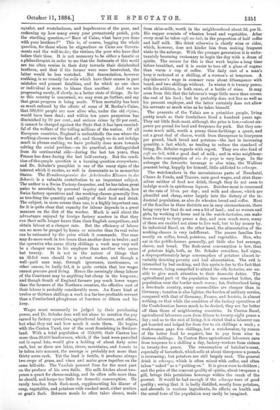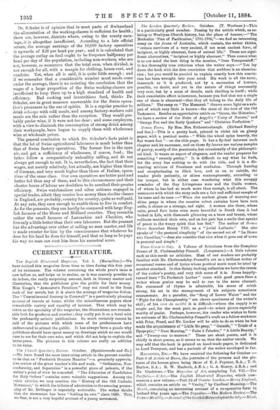THE ALIMENTATION OF THE WORKING-CLASSES.*
IN his article on Anarchy, in a late number of the Contemporary Review, M. klisee Reclus, after describing in moving terms the • Die Ernahrungeteeiee der Arbeitenden KIC1811471 in der Schweiz. Von Dr. Schuler, eidg. Fabrikinepektor. Bern : Stiimpli'sche Bachdruckerel, 189 t. squalor, and wretchedness, and hopelessness of the poor, and reckoning up how many every year prematurely perish, puts the startling question,—" Race of Coins, what have you done with your brothers ?" This is, of course, begging the whole question, for those whom he stigmatises as Caine are Govern- ments and the well-to-do ; the victims, the poor who have died before their time. It is not necessary to be either a fanatic or a philanthropist in order to see that the fortunate of this world are too often remiss in their duty towards their disinherited brethren, and that if the former were more benevolent, the latter would be less wretched. But denunciation, however scathing, is no remedy for evils which have their causes in past mistakes and present fatalities, and for which no one class or individual is more to blame than another. And we are progressing surely, if slowly, to a better state of things. So far as this country is concerned, we may even go further, and say that great progress is being made. When mortality has been so much reduced by the efforts of some of M. Reclns's Caine, that 500,000 people are now alive who, under the old regime, would have been dead ; and within ten years pauperism has diminished by 30 per cent., and serious crime by 20 per cent., it cannot be charged against the State that it has been unmind- ful of the welfare of the toiling millions of the nation. Of all European countries, England is undoubtedly the one where the working-classes are the best off ; and though we do not indulge much in phrase-making, we have probably done more towards solving the social problem—on its practical, as distinguished from its sentimental side—during the last ten years, than France has done during the last half-century. But the condi- tion-of-the-people question is a burning question everywhere; and Dr. Schuler's pamphlet is one of the many signs of the interest which it excites, as well in democratic as in monarchic States. The Ernahrungsweise der Arbeitenden Klassen in der Schweiz is a valuable contribution to an important subject. The author is a Swiss Factory-Inspector, and he has taken great pains to ascertain, by personal inquiry and observation, how Swiss factory operatives and the working-classes generally live, as touching the quantity and quality of their food and drink. The subject, in more senses than one, is a highly important one, for it is quite clear that capacity for labour depends in a great measure on the diet of the worker. Much is said about the advantages enjoyed by foreign factory masters in that they run their mills longer hours than their English competitors, and obtain labour at a cheaper rate. But the efficiency of labour can no more be gauged by hours or minutes than its real value can be estimated by the price which it commands. One man may do more work in ten hours than another does in twelve ; and the operative who earns thirty shillings a week may very well be a cheaper man to his employer than another who earns
but twenty. It is not in the nature of things that an ill-fed man should be a robust worker, and though a well paid man may, through ignorance, carelessness, or other causes, be badly fed, it is quite certain that low wages cannot procure good living. Hence the seemingly cheap labour of the Continent may be anything but cheap in the long-run; and though South of England farmers pay much lower wages than the farmers of the Northern counties, the effective cost of their labour is probably considerably more. An Essex hind at twelve or thirteen shillings a week is a far less profitable servant than a Cumberland ploughman at fourteen or fifteen and his keep.
Wages must necessarily be judged by their purchasing power, and Dr. Schuler does well not alone to mention the pay earned by factory operatives, agricultural labourers, and others, but what they eat and how much it costs them. He begins with the Canton Vaud, one of the most flourishing in Switzer- land. With a total population of 350,000, their Canton has more than 20,000 landowners, which, if the land were parcelled out in equal lots, would give a holding of about forty acres each, but as there are lakes, rivers, mountains, and forests to be taken into account, the average is probably not more than thirty acres each. Yet the land is fertile, it produces always two crops of grass, and vines and maize grow together on the same hill-side. • The Vaudois peasant lives for the most part on the produce of his own fields. His milk fetches about two- pence a quart for cheese-making, and he often sells more than he should, and, keeps too little for domestic consumption. He rarely touches fresh flesh-meat, supplementing his dinner of soup, vegetables, and potatoes with smoked meat, either mutton or goat's flesh. Between meals he often takes cheese, made
from skim-milk, worth in the neighbourhood about 3d. per lb. His supper consists of wheaten bread and vegetables. After
every meal he takes cafe an lait, in the proportion of half coffee
and half milk. His drink otherwise is chiefly wine or cider, which, however, does not hinder him from making frequent visits to the anberge. With the younger generation it is unfor- tunately becoming customary to begin the day with a dram of spirits. The excuse for this is that work begins a long time
before breakfast, and it is easier to toss off a glass of cognac
than warm a cup of coffee. The daily cost of a man's keep is reckoned at a shilling, of a woman's at tenpence. A
day-labourer's wage in summer runs about fifteenpence with
board, and two shillings without. In winter it is twenty pence, with the addition, in both cases, of a bottle of wine. It may
seem from this that the labourer's wage little more than covers the cost of his food ; but he probably does not live as well as his peasant employer, and the latter certainly does not allow his servants as much wine as he takes himself.
The peasants of the Valais are a primitive people, living pretty much as their forefathers lived a hundred years ago.
They eat little flesh-meat, although the price is low,—about six-
pence per pound for beef and fivepence for pork. But they con- sume much milk, worth a penny three-farthings a quart, and eat a great deal of cheese, worth from threepence to fourpence per pound, black bread and potatoes—the last in increasing quantity, a fact which, as tending to reduce the standard of living, Dr. Schuler regards with regret. They are also fond of café au lait, with a good deal of milk; and in wine neighbour- hoods, the consumption of yin du pays is very large. In the anberges the favourite beverage is also wine, the Walliser peasant being, happily for himself, little addicted to schnaps.
The watchmakers in the mountainous parts of Neuchatel, Chaux de Fonds, and Travers, earn good wages, and stint them-
selves neither of food nor. drink, though they do not seem to indulge much in spirituous liquors. Butcher-meat is consumed at the rate of 10 oz. per day ; and milk and cheese, which are plentiful and cheap, enter largely into the dietary of the in-
dustrial population, as also do wheaten bread and coffee. Most of the families in these districts are in easy circumstances, there being very few that do not own a bit of land ; and as women and girls, by working at home and in the watch-factories, can make from twenty to forty pence a day, and men much more, many of them are enabled not alone to live well, but to lay money by.
In industrial Basel, on the other hand, the alimentation of the working-classes is very indifferent. The poorer families live mostly on coffee, bread, potatoes, and vegetables. Men, who eat in the public-houses generally, get little else but sausage, cheese, and bread. The flesh-meat consumption is low, that of potatoes high, both, as Dr. Schuler considers, bad signs, a disproportionately large consumption of potatoes almost in- variably denoting poverty and bad alimentation. The evil is a disproportionately large consumption of potatoes almost in- variably denoting poverty and bad alimentation. The evil is intensified by bad cooking, and this again is due to the fact that the women, being compelled to attend the silk factories, are un- able to give much attention to their domestic duties. The agricultural part of the population fare somewhat better, the
population over the border much worse ; for; Switzerland being a free-trade country, many commodities are cheaper than in
Germany; taxation is also lighter, the burden of military service, compared with that of Germany, France, and Austria, is almost nothing, so that while the condition of the factory operatives of
the Confederation leaves much to be desired, they are far better off than those of neighbouring countries. In Canton Basel, agricultural labourers earn from fifteen to twenty-eight pence a day ; and as to the cost of living, it is stated that a labourer can get boarded and lodged for from five to six shillings a week ; a workwoman pays five shillings, but a watchmaker, by reason of the better food he requires, has to pay from nine to thirteen shillings. In Canton Bern agricultural labourers earn from tenpence to a shilling a day, factory-workers from sixteen to twenty-five pence. The consumption of butcher's-meat, especially of horseflesh, which sells at about threepence a pound, is increasing; but potatoes are still largely used. The general drink is schnaps, which is often mixed with coffee, and often taken" naked " as a "putting on." It is given even to children ; and the price of the coarsest quality of spirits, about twopence a gill, brings this pernicious beverage within the reach of the poorest. It would be bad enough if the schnaps were of good quality ; seeing that it is badly distilled, mostly from potatoes, and abounds in noxious ingredients, its effects on health and the moral tone of the population may easily be imagined. Dr. Schuler is of opinion that in most parts of Switzerland the alimentation of the working-classes is sufficient for health ; there are, however, districts where, owing to the scanty earn- ings, it is altogether insufficient. According to a late official return, the average earnings of the 10,000 factory operatives is upwards of /28 per head per year ; and it is calculated that the average outlay on food ought to be fivepence halfpenny per head per day of the population, including non-workers, who are not, however, so numerous that the total sum, when divided, is not enough for all, with a margin for clothing, house-rent, and sundries. Yet, when all is said, it is quite little enough ; and if we remember that a considerable number must needs come under the average, there is no resisting the conclusion that the wages of a large proportion of the Swiss working-classes are insufficient to keep them up to a high standard of health and efficiency. Bad cooking and innutritious food, thinks Dr. Schuler, are in great measure answerable for the Swiss opera- tive's proneness to the use of spirits. It is a regular practice to drink schnaps with cold meals, and among factory-workers cold meals are the rule rather than the exception. They would pro- bably prefer wine, if it were not too dear ; and some employers, with a view to diminish the consumption of strong drink among their workpeople, have begun to supply them with wholesome wine at wholesale prices.
The general conclusion to which Dr. Schuler's facts point is that the lot of Swiss agricultural labourers is much better than that of Swiss factory operatives. The former live in the open air, and get a sufficiency of wholesome, if coarse, food ; the latter follow a comparatively unhealthy calling, and do not always get enough to eat. It is, nevertheless, the fact that their wages, not merely relatively, but actually, are higher than those of German, and very much higher than those of Italian, opera- tives of the same class. Our own operatives are better paid and better fed than any of them, and to this circumstance and their shorter hours of labour are doubtless to be ascribed their greater efficiency. Swiss watchmakers and other artisans engaged in special trades, albeit they receive less money than similar classes in England, are probably, country for country, quite as well paid. At any rate, they earn enough to enable them to live in comfort. As for the peasants, they can hardly be compared with large Eng- lish farmers of the Home and Midland counties. They resemble rather the small farmers of Lancashire and Cheshire, who live only a little better than their own labourers. But the peasant has the advantage over either of calling no man master, and life is made sweeter for him by the consciousness that whatever be does for his land he does for himself, and that so long as be pays his way no man can oust him from his ancestral acres.




































 Previous page
Previous page